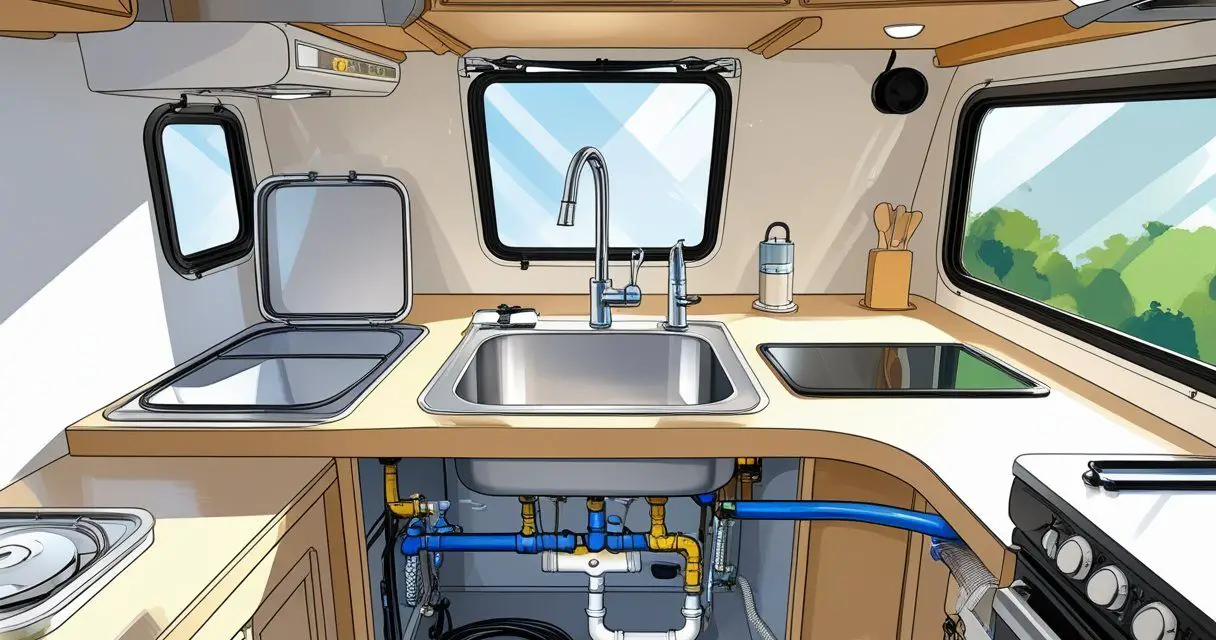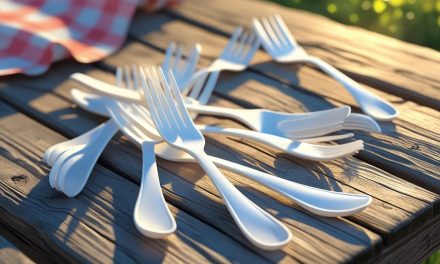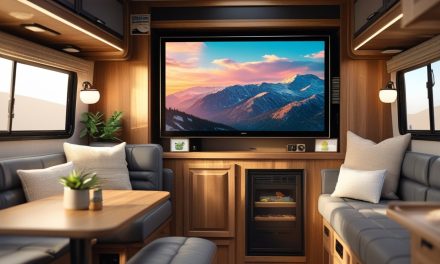You may wonder, “Can I drink RV water safely?” Many RV owners face this question each time they fill their tanks. Sometimes the taste seems off. At other times, you worry about germs or chemicals in your water.
A study showed that untreated RV water can hold bacteria and other contaminants. This can make you sick or ruin a camping trip. Clean drinking water is important for everyone in your motorhome.
This blog will guide you with expert tips on keeping your RV’s potable water clean and safe. You will learn smart habits like using filtration systems, sanitizing the freshwater system, and choosing the right hoses for drinking water quality.
We cover simple steps for better hygiene, maintenance, disinfection, and proper sanitation procedures too.
Stay tuned to learn how to enjoy every sip of fresh RV water without worry!
The Importance of Treating RV Drinking Water
Treating RV drinking water is crucial for your health. Contaminants can lurk in your water tanks and pose risks if consumed.
Would you like to save this article?
Potential contaminants in RV water tanks
RV water tanks can harbor several harmful contaminants. Bacteria and viruses can enter your system through dirty hoses or unfiltered freshwater sources. Algae can also grow in stagnant water, posing additional health risks.
These contaminants may lead to serious illnesses if consumed without proper treatment.
To maintain clean drinking water, you must sanitize your RV’s fresh water system at the beginning of each camping season. Regularly refreshing the water every few days keeps it safe for usage.
You should use a high-quality filtration system in your RV to remove potential impurities effectively. This helps ensure that the water you drink is not only potable but also free from harmful substances.
Health risks of consuming untreated water
Untreated water poses serious health risks. It can contain harmful bacteria, viruses, and parasites that cause illness. Drinking this water may lead to stomach cramps, diarrhea, and vomiting.
These conditions can quickly dehydrate you while on the road. Harmful contaminants in your RV’s freshwater system could make you very sick.
You must sanitize your RV’s freshwater system at the start of each camping season. This step is crucial even if you don’t plan to drink the water. Regularly filter the incoming water for added safety; a quality filtration system helps avoid potential issues with clean drinking water.
By taking proactive steps toward sanitation and cleanliness, you ensure safe hydration during your travels ahead in tips for safe drinking in your RV.
Tips for Safe Drinking in Your RV
Filtering your incoming water can greatly improve its quality. Regularly check and maintain your RV’s water filtration system to ensure safe drinking at all times.
Filtering the incoming water
Using a water filtration system in your RV keeps your drinking water safe. Filters remove harmful contaminants from the incoming supply before you use it. Regularly check and replace the filters to maintain their effectiveness.
Clean and sanitized water prevents many health risks associated with untreated sources.
Consider using a high-quality RV water filter for optimal results. These systems help ensure that the water you drink, cook with, and shower in meets cleanliness standards. A well-maintained filtration system is essential for good hygiene while traveling in your RV.
Regulating water intake
You should regulate your water intake in your RV to stay healthy and hydrated. Drink plenty of water throughout the day, especially during hot weather or after physical activities.
Proper hydration keeps your energy levels up while camping.
Consider using a high-quality RV filtration system for safe drinking water. This will enhance the quality of what you consume. Remember to use a specific drinking water hose designed for RVs.
It helps ensure cleanliness and hygiene in the drinking process. Regularly sanitize your freshwater tank to avoid any unwanted contaminants as well.
Next, let’s explore how utilizing onboard RV water filtration can improve safety further.
Utilizing onboard RV water filtration
Regulating your water intake is crucial for staying hydrated. Utilizing onboard RV water filtration adds another layer of safety to your drinking experience. A good filtration system in your RV can significantly improve the quality of the water you consume.
This ensures that both drinking and cooking uses meet cleanliness standards.
Invest in a high-quality RV water filter for effective purification. Regularly check and sanitize your freshwater tank to maintain optimal conditions for clean drinking water. Consider using a Berkey water filter, known for its reliability, during your travels.
Always use a drinking hose designed specifically for RVs; it helps safeguard against harmful contaminants effectively. Taking these proactive steps leads to safer hydration as you enjoy life on the road!
Drinking water and ice filtration options
Utilizing onboard RV water filtration leads directly to the topic of drinking water and ice filtration options. A high-quality RV water filter ensures your drinking water is clean and safe.
This system removes harmful contaminants, giving you peace of mind while you sip. Also, consider using a Berkey water filter for exceptional results in your RV.
To improve the quality of your ice, use filtered water when making it. Clean ice enhances both taste and safety in your drinks. Always remember to maintain good hygiene with all aspects of food and drink in your RV space for better health outcomes.
Taking these steps guarantees a safer experience during your travels.
Purifying RV fresh water tanks
Sanitize your RV’s fresh water tank at the start of each camping season. Even if you do not plan to drink the water, this step is essential for maintaining cleanliness and hygiene.
Use a mixture of bleach and water to purify the tank. A common ratio is one cup of bleach per 15 gallons of water. Fill the tank with this solution, then turn on all faucets until you smell bleach.
Let it sit for several hours before draining.
After sanitization, refill your tank with clean potable water. Regularly sanitize your fresh water system to avoid any buildup that can affect water quality over time. Taking these proactive measures helps ensure safe drinking and cooking in your RV.
Next, explore tips for effective filtration options in your RV.
Conclusion
You can drink RV water safely with the right steps. Treat your water regularly to reduce contaminants and improve quality. Always install a good filtration system for added protection.
Make sure you use appropriate hoses designed for drinking water only. Stay proactive about your hygiene and safety, and enjoy clean hydration on every trip!







